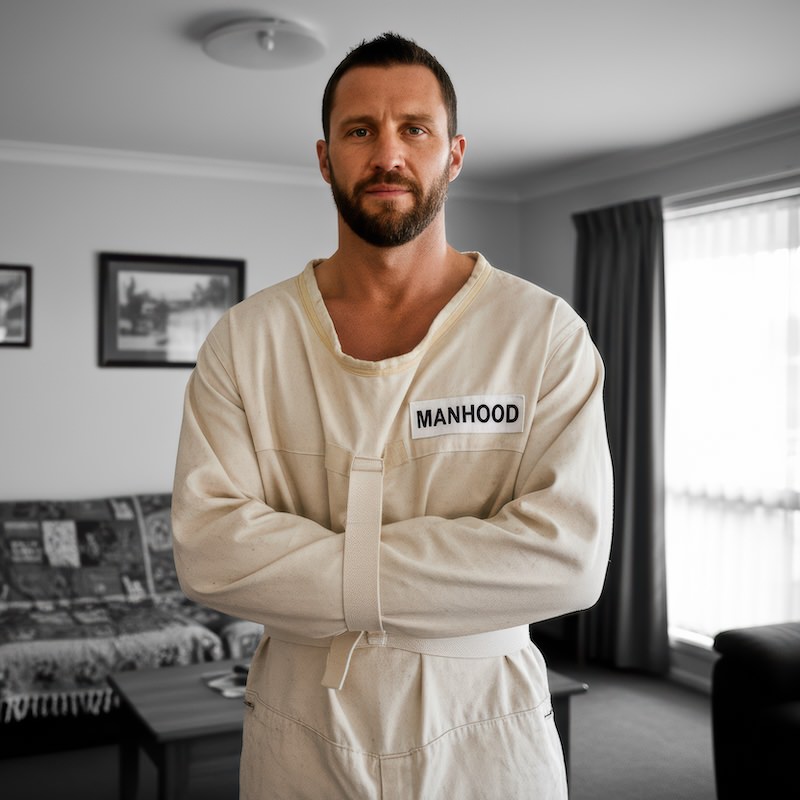Men don’t cry (except at Rocky IV)
Most blokes over 50 can still rattle off the 1998 State of Origin lineup, but ask them the last time they had an honest emotional conversation, and you’ll likely get a blank stare, or a grunt. We were raised with rules: don’t cry, suck it up, carry on. Emotions? Those were for women, poets, or the losing team.
But here’s the sobering truth: this old-school stoicism is killing us. Men in Australia are three times more likely to die by suicide than women, according to the Australian Bureau of Statistics. That’s not a mental health statistic, that’s a cultural crisis.
What if the definition of masculinity we grew up with (tough, silent, self-reliant) isn’t just outdated but dangerous? What if the strongest thing you can say isn’t “I’m fine” but “I’m not”?
The emotional straitjacket we called “manhood”
The emotional rulebook for boys starts early: Don’t cry. Harden up. Don’t be a girl. These mantras follow us into adulthood, where pain gets stuffed down and only resurfaces as rage, withdrawal, or sarcasm at the family BBQ.
The RACGP and Life in Mind Australia both identify stoicism and emotional suppression as key risk factors for male suicide. We’ve been taught to bottle up our stress, our grief, our confusion. But as anyone who has put a glass bottle by a burning fire pit know, a bottle can only hold so much before it explodes, or breaks quietly.
In one study from Beyond Blue, men cited shame, fear of weakness, and “not wanting to burden others” as the biggest reasons they don’t reach out. Ironically, those same men would drop everything to help a mate. Go figure.
When therapy looks like a man cave
Enter: Man Therapy. It sounds like a joke. That’s the point. Starring a fictional therapist named Dr. Rich Mahogany, a deadpan, flannel-shirt-wearing cross between Ron Swanson and Dr. Phil, the campaign uses humour to break down resistance.
One of their taglines: “It’s OK to cry. Even if it’s not about sports.”
Another funny tagline of theirs that I like is, “You can’t fix your mental health with duct tape.” It’s comedy with a purpose, and it works. A study in the Journal of Mental Health Promotion found that Man Therapy led to a statistically significant reduction in depressive symptoms and suicidal ideation among men aged 40–65.
Why? Because laughter disarms. It slips past defenses. And when your therapist makes dad jokes while talking about trauma, suddenly it doesn’t feel so scary to open up.
Not all men want to laugh. Some want facts, simplicity, and straight-up advice. That’s where HeadsUpGuys shines. Designed by the University of British Columbia, it’s a no-frills, no-BS mental health resource tailored specifically for men. It offers self-assessments, action plans, and real stories from real men. Not celebrities, not gurus, just blokes who’ve been through the fire and made it out the other side. Their messaging? Seeking help isn’t a weakness. It’s maintenance. Like changing the oil before your engine seizes.
Past attendees have called it ‘Real Talk’ and ‘A no fluff approach’, which is why HeadsUpGuys suits many men.
The power of “R U OK?”
Then there’s the quiet revolution: R U OK? Day. It’s not therapy. It’s not tech. It’s just four words. But those four words have started thousands of life-saving conversations. In Australia’s footy sheds, on mining sites, at barbecues and boardrooms, this simple check-in is challenging the unspoken bro-code. You don’t have to “fix” your mate. You just have to ask. Listen. And follow up. According to the R U OK? Foundation, 78% of Australians have been asked the question, but fewer than 50% had a genuine conversation afterward. That’s the next frontier: going beyond the ritual into real connection.
Stuart O’Neill, founder of Just One Reason set up his health clinic in his pub in country NSW. Every Tuesday night people drive for miles to come and talk, listen, be witnessed. He has tapped into something primal which is, create a safe space in a familiar location and people will talk to each other. Pubs have always been that space for men.
Rewriting the script, one laugh and conversation at a time
What unites these campaigns, from the satire of Man Therapy to the stoic straight-talk of HeadsUpGuys, to a country pub, is simple: they meet men where they are. They don’t demand vulnerability overnight. They don’t shame silence. Instead, they offer new scripts, new language, and (most importantly) permission. That is, permission to not be the unflinching hero all the time. To be human. To say, “This is hard.” Or even, “Help.”
It’s like that quote from Muhammad Ali: “It isn’t the mountains ahead to climb that wear you out; it’s the pebble in your shoe.” We’ve all got pebbles. Maybe it’s time to start talking about them. Philosopher Brené Brown said, “Vulnerability is not winning or losing. It’s having the courage to show up when you can’t control the outcome.” That’s not a weakness. That’s bravery.
So next time a mate says, “I’m fine,” maybe don’t take his word for it. Ask twice. Or just sit beside him with a beer, and a bit more curiosity. Because real mates don’t let mates suffer in silence. And real men? They talk. They feel. They cry during Rocky IV — and maybe The Notebook, too (but only if asked directly).
